Related Research Articles

Jewish American literature holds an essential place in the literary history of the United States. It encompasses traditions of writing in English, primarily, as well as in other languages, the most important of which has been Yiddish. While critics and authors generally acknowledge the notion of a distinctive corpus and practice of writing about Jewishness in America, many writers resist being pigeonholed as "Jewish voices." Also, many nominally Jewish writers cannot be considered representative of Jewish American literature, one example being Isaac Asimov.
Gitl Schaechter-Viswanath is a Yiddish-language poet and author.

Dan Miron is an Israeli-born American literary critic and author.

Ruth Wisse is a Canadian academic and is the Martin Peretz Professor of Yiddish Literature and Professor of Comparative Literature at Harvard University emerita. She is a noted scholar of Yiddish literature and of Jewish history and culture.

Ori Kritz is an Associate Professor and head of the Hebrew Language and Literature program at the University of Oklahoma, a part of the Judaic Studies department. She is a multilingual writer and speaker, specializing in Yiddish, Hebrew, and Jewish literature and in Jewish and Israeli humor.
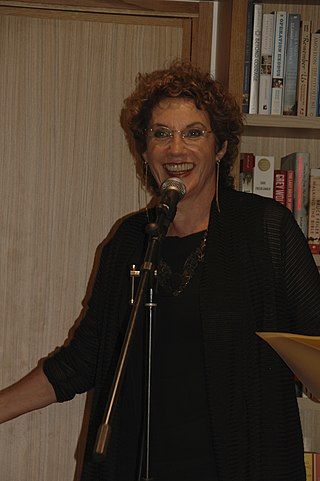
Karen Alkalay-Gut is a poet, professor, and editor who lives in Israel and writes in English.
Yael S. Feldman is an American cultural historian and literary critic. She is particularly known for her work in comparative literature and feminist Hebrew literary criticism. Feldman is known for her research on Hebrew culture, history of ideas, gender and cultural studies, and psychoanalytic criticism. She is currently the Abraham I. Katsh Professor Emerita of Hebrew Culture and Education in the Judaic Studies Department at New York University and an affiliated professor of Comparative Literature and Gender Studies. She is also a fellow of the American Academy for Jewish Research, and a visiting fellow at Wolfson College, Cambridge.
Ken Frieden is the B.G. Rudolph Professor of Judaic Studies— and a full professor in the Departments of English, Languages, Literatures, and Linguistics, and Religion — at Syracuse University. He writes about, edits, and promotes Hebrew, Yiddish, and other Jewish literature.
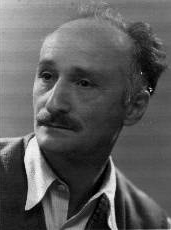
Alexander Bogen was a Polish-Israeli visual artist, a decorated leader of partisans during World War II, a key player in 20th century Yiddish culture, and one of the trailblazers for art education and Artists' associations in the emerging state of Israel.
Evelyn Torton Beck has been described as "a scholar, a teacher, a feminist, and an outspoken Jew and lesbian". Until her retirement in 2002 she specialized in women's studies, Jewish women's studies and lesbian studies at the University of Maryland, College Park.
Ziva Ben-Porat is a literary theorist, writer, and editor who lives in Israel and is a professor at Tel Aviv University.
Jona Goldrich was an American real estate developer and philanthropist. Born in Lviv, he emigrated to Israel in the midst of World War II, where he served in the 1948 Arab–Israeli War and worked for a labor union. By the 1950s, he emigrated to the United States, and he became a real estate developer and investor in Los Angeles County. A Holocaust survivor, he supported Jewish causes in Israel and the United States.
Rivka Basman Ben-Hayim was a Lithuanian-born Israeli Yiddish poet and educator. She was the recipient of the Itzik Manger Prize in 1984. Basman was also awarded the Chaim Zhitlowsky Prize in 1998.

Rokhl Auerbakh was an Israeli writer, essayist, historian, Holocaust scholar, and Holocaust survivor. She wrote prolifically in both Polish and Yiddish, focusing on prewar Jewish cultural life and postwar Holocaust documentation and witness testimonies. She was one of the three surviving members of the covert Oyneg Shabes group led by Emanuel Ringelblum that chronicled daily life in the Warsaw Ghetto, and she initiated the excavation of the group's buried manuscripts after the war. In Israel, she directed the Department for the Collection of Witness Testimony at Yad Vashem from 1954 to 1968.

Nechama Lifshitz was a Yiddish language and later Hebrew language soprano and art song performer who came to be a key representative of Soviet Jewish culture in the 1950s and 1960s. Her seemingly innocent concerts were the heart and soul of Lipshitz's contribution to keeping Jewish culture and identity alive in the Communist bloc.
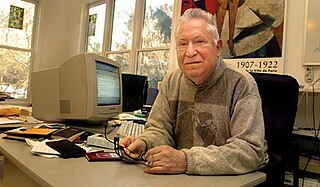
Benjamin Harshav, born Hrushovski ; June 26, 1928 – April 23, 2015 was a literary theorist specialising in comparative literature, a Yiddish and Hebrew poet, and an Israeli translator and editor. He served as professor of literature at the University of Tel Aviv and as a professor of comparative literature, Hebrew language and literature, and Slavic languages and literature at Yale University. He was the founding editor of the Duke University Press publication Poetics Today. He received the EMET Prize for Art, Science and Culture in 2005 and was a member of the American Academy of Arts and Sciences.
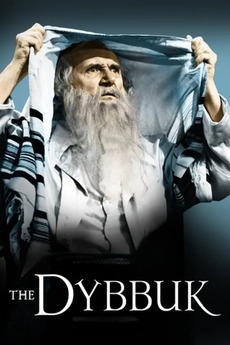
"The Dybbuk" is a 1960 television production of the Russian play The Dybbuk by Sholom Ansky, which was authored between 1913 and 1916 and is considered a Yiddish classic, with Cambridge University Press calling it "probably the most performed of any Yiddish play". It was directed by Sidney Lumet for The Play of the Week from an adaptation into English by Joseph Liss. The program, starring Carol Lawrence aired on October 3, 1960.
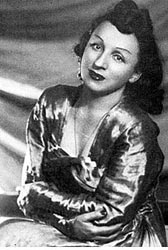
Anna Guzik was a Soviet variety artist, Russian and Yiddish theatre actress, and recording artist. Like Zinovy Shulman, Nechama Lifshitz, Sidi Tal, and Emil Gorovets, she had a career performing Jewish music and plays on the Soviet stage which was marked by various periods of censorship and official support depending on the political climate.

Rakhel Feygenberg, often known by her Hebrew pen name Rakhel Imri, was a Russian-born Israeli writer, playwright, translator and journalist who wrote in both Yiddish and Hebrew. She wrote and published prolifically from the early 1900s to the 1960s.
Ephraim Eliyahu Lisitzky was an American Hebrew poet, writer, and educator.
References
Notes
- 1 2 3 Wirth-Nesher 2009, p. 11.
- 1 2 3 4 5 6 7 8 9 10 11 12 13 "Hana Wirth-Nesher" (PDF). United States Holocaust Memorial Museum . Retrieved 20 December 2015.
- 1 2 3 4 5 "Prof. Hana Wirth-Nesher". University of Tel Aviv Department of English and American Studies. Archived from the original on 1 March 2015. Retrieved 20 December 2015.
- ↑ Klingenstein, Suzanne (1 March 2009). "Literature Scholars in the United States". Jewish Women's Archive . Retrieved 26 December 2015.
- ↑ "Prof. Wirth-Nesher". Congregation B'nai Israel. 2010. Archived from the original on 5 January 2016. Retrieved 27 December 2015.
- ↑ "Dickens Studies Annual: Essays on Victorian fiction". University of California at Santa Cruz. 1986. Retrieved 27 December 2015.
- ↑ Rosner, Shmuel (31 March 2013). "Q&A: Philip Roth and the Jews". The Jewish Journal of Greater Los Angeles . Retrieved 27 December 2015.
- ↑ Cleland, Jaime (1 October 2006). "Call It English: The Languages of Jewish American Literature". Women's Studies Quarterly. Archived from the original on 20 February 2016. Retrieved 27 December 2015.
- 1 2 "Professor Hana Wirth-Nesher CV". Tel Aviv University. Retrieved 26 December 2015.
- 1 2 Chabin, Michele (9 September 2007). "Nostalgia Spurs Young Israelis To Take Another Look at Yiddish". The Washington Post . Archived from the original on 20 February 2016. Retrieved 26 December 2015.
- 1 2 Maltz, Judy (21 December 2012). "Yiddish Is Dead. Long Live Yiddish!". Haaretz . Retrieved 26 December 2015.
- ↑ Rotem, Tamar (16 July 2009). "Young Eastern Europeans Flock to Tel Aviv's 'Yiddish Summer Camp'". Haaretz. Retrieved 26 December 2015.
- ↑ Greene, Adinah (26 July 2006). "TA University Wraps Up Summer Yiddish Program". The Jerusalem Post . Retrieved 26 December 2015.
Sources
- Wirth-Nesher, Hana (2009). Call It English: The Languages of Jewish American Literature. Princeton University Press. ISBN 978-1400829538.